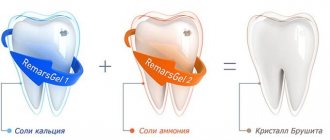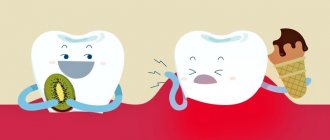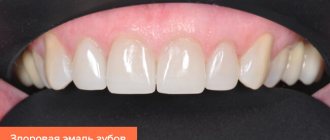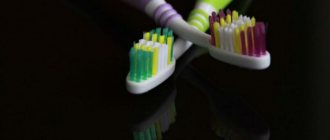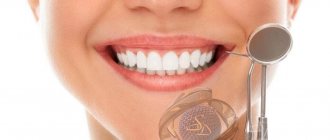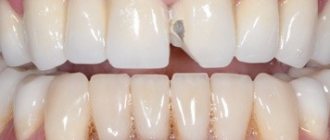Causes of destruction of the enamel layer of teeth
Enamel is a mineral layer about 2 mm thick that covers the crown of the teeth.
97% consists of a crystalline substance of hydroxyapatite with small inclusions of calcium, fluorine, magnesium, and carbon. Performs a protective function, protects dentin and pulp from external influences. This is the hardest tissue in the human body; 1 square millimeter of its area can support 397.6 kg. But, nevertheless, even such a durable material can begin to deteriorate due to exposure to physical or chemical factors. The most common causes of enamel destruction:
- accumulation of plaque due to poor hygiene;
- exposure to concentrated acids contained in natural juices and carbonated drinks;
- unbalanced diet, large amounts of carbohydrates in the daily diet;
- mechanical injuries to the tooth crown with the formation of cracks and chips;
- bad habits of chewing pens and pencils;
- bite defects;
- wearing braces;
- abnormal abrasion of the enamel layer;
- bruxism (uncontrolled teeth grinding);
- sudden changes in temperature (for example, hot coffee after ice cream);
- diseases accompanied by leaching of calcium from the body (diabetes mellitus and other pathologies of the endocrine system);
- hereditary factor;
- stomach diseases in which the absorption of calcium and phosphorus is impaired;
- metabolic destabilization;
- caries;
- periodontal diseases;
- age-related tissue nutritional disorders.
Clinical researches
Clinical studies have proven that regular use of professional toothpaste ASEPTA REMINERALIZATION improved the condition of the enamel by 64% and reduced tooth sensitivity by 66% after just 4 weeks.
Sources:
- Features of personal response in the prevention and treatment of hypersensitivity of teeth against the background of type 2 diabetes mellitus A.K. YORDANISHVILI, Doctor of Medical Sciences, Professor, North-Western State Medical University named after. I.I. Mechnikov, Military Medical Academy named after. CM. Kirova, International Academy of Sciences of Ecology, Human Safety and Nature, N.A. UDALTSOVA, Candidate of Medical Sciences, Associate Professor, St. Petersburg State University of the Government of the Russian Federation; dental clinic No. 29, Frunzensky district of St. Petersburg, O.V. PRYSYAZHNYUK, head. surgical department No. 2, dental clinic No. 29, Frunzensky district of St. Petersburg
- Report on the determination/confirmation of the preventive properties of personal oral hygiene products “ASEPTA PLUS” Remineralization doctor-researcher A.A. Leontyev, head Department of Preventive Dentistry, Doctor of Medical Sciences, Professor S.B. Ulitovsky First St. Petersburg State Medical University named after. acad. I.P. Pavlova, Department of Preventive Dentistry
How to determine when it’s time to restore enamel
In order to preserve the integrity of the enamel layer as much as possible (or at least stop its destruction), it is very important not to miss the first signs of the pathological process. Its initial stages are characterized by demineralization of a local area of the tooth surface. It looks like a white, non-glossy spot. This clinical picture is called caries in the white spot stage. Another sign is the appearance of tooth sensitivity. Normally, a person does not feel the touch of the tongue on the teeth, there are no unpleasant sensations when chewing food. There is also no reaction when the teeth come into contact with cold, hot, sweet or sour foods. If any of the listed signs appear in the patient, this means that the enamel layer of his teeth has begun to gradually deteriorate. The following stages of enamel corrosion are visible to the naked eye. A local dark area forms on the surface of the tooth, then it begins to expand in area and go deeper into the dentin. These are signs of a serious defect. Correcting it will require more complex measures than when the first symptoms appear.
Important: a person cannot always independently see the stage of a white spot or a small black spot. Therefore, it is extremely important to visit your dentist for a checkup twice a year. Specialists from our network of clinics will be able to promptly detect an emerging defect and eliminate the damage with minimal intervention in the tooth structure (or without it at all). Our branches are equipped with modern equipment and instruments, including dental microscopes for diagnosis and treatment.
Read also
What is dental restoration
If the aesthetic properties of teeth are lost, a person experiences certain discomfort.
Who is an orthopedic dentist?
Orthopedics in dentistry is a branch of medicine that deals with the restoration of teeth using all modern prosthetic techniques.
Restoration methods for the initial stage of destruction
Restoration of tooth enamel is the implementation of measures aimed at reconstructing the appearance of the enamel layer and restoring the protective functions it performs.
It is performed using various methods depending on the condition of the enamel. The earlier measures are taken, the better the effect. When initial symptoms appear, the following measures are effective:
- professional hardware teeth cleaning;
- remineralization – saturation of enamel with essential minerals, including fluoridation (coating teeth with a special varnish).
Note: it is impossible to restore enamel at home. The patient can only help the doctor. To do this, he must review his diet, carefully carry out hygienic dental care, eradicate bad habits, and begin treating systemic diseases (if any).
Diagnostics
Taking an anamnesis is of great importance in diagnosis. The patient is asked whether he has had complaints before. If yes, what treatment was given. The presence of general, especially endocrine diseases is clarified. Find out under what conditions he works.
Then an external examination is carried out. Pay attention to the symmetry of the face and the severity of the folds. Check the functioning of the TMJ. The height of the lower part of the face is assessed by taking special measurements.
When examining the oral cavity, pay attention to the bite, overlap of the incisors, and wear of the teeth. The contacts of the teeth are assessed when the jaws are closed.
To get an accurate picture of the condition of the crowns and bone tissue, an orthopantomogram (panoramic image) and targeted images are taken. According to indications, tomography of the TMJ is prescribed.
Restoration methods for serious enamel defects
In cases where the enamel layer has undergone significant destruction, a set of measures consisting of two stages is indicated, the first of which is dental treatment of the damaged tooth. Only then will the dentist begin the actual restoration. This could be the application of artificial enamel, composite restoration or dentures. The methods listed above help stop decay, restore the appearance, and protect the inner layers of the tooth.
Relatively small defects can be eliminated by applying artificial enamel or composite reconstruction (the doctor uses special materials to recreate the shape of the tooth). More serious problems of the enamel layer are solved by installing microprostheses (veneers or lumineers). These are the thinnest pads that the orthopedist fixes to the vestibular surface. If the dental element is destroyed to a significant extent, then the doctor forms a stump and installs a crown on it.
Note: the choice of restoration option for the enamel layer is made by the dentist after diagnostics and identification of the extent of the damage.
Pasta that made a splash on the internet
Having familiarized yourself with the data on well-known types of toothpastes, you can understand the reasons that caused a sharp surge in interest in a new toothpaste that will save you from going to the dentist. The fact is that advertising articles claim that such a paste treats caries at any phase of development.
According to advertising brochures, such a paste can replace a trip to the dentist. Once in the affected area, it, according to the manufacturer, first produces acid erosion, creating a fastening, and then hardens, while being practically no different from the enamel of healthy teeth.
Blogs and websites, adopting unverified information from each other, show various photos of the paste and the results of its action. They clearly show that this is not a Japanese, but a Korean development (clear for philologists and those who once became familiar with similar products). The photographs show toothpaste from the charcoal series. The main ingredient in them is activated carbon, which is why the color of this pharmacists' product is black. Such a paste can only fight bacteria that cause caries. And even then not always.
Other photos that show the results of the treatment look downright scary. The woman's pretty face stuns with a black coal smile, creating a truly disgusting effect.
A serious medical product that cures caries cannot consist of ingredients such as charcoal. This paste can be compared to those containing oak bark, chamomile or marigold.
This development has been known for about ten years. Some of us bought it, and were surprised by such an invention until we compared the effect of its influence with the effect of the drugs we are used to. It turned out to be many times worse.
Prevention measures
- Careful hygiene at home - at least twice a day, every day
- Clinic visits for professional cleaning – once or twice a year
- Eating foods high in vitamins and minerals
- Reducing intake of high carbohydrate foods
- Avoiding carbonated sugary drinks
- Timely treatment of dental and periodontal diseases
The network of dental clinics “Smile” offers services for restoring tooth enamel. Contacting our specialists has a number of undeniable advantages:
- treatment by highly qualified doctors;
- compliance with treatment protocols that meet international standards;
- family and savings discounts;
- transparent pricing;
- Convenient work schedule: daily until 21:00 (Sunday until 16:00).
You can make an appointment at any of the branches of our clinic in Moscow, located within walking distance from metro stations:
- Art. Alekseevskaya (VDNKh district, etc. Mira), address: st. 3rd Mytishchiskaya house 3, building 2;
- Art. Shelepikha, address: Shelepikhinskaya embankment, address: building 34, building 1.
The high qualifications of our specialists and modern equipment allow us to solve the problem of restoring enamel at any stage of destruction. We guarantee the effectiveness of treatment and the safety of the methods used. Your health is in good hands!
Classification
Teeth abrasion is divided according to:
- Stages
During the active stage, increased abrasion of hard tissue occurs. At the stabilization stage, their condition can be maintained at an acceptable level.
- Distribution
With localized abrasion, the front teeth are most often worn down. In generalized cases, all crowns suffer and the height of the bite decreases. In severe cases, the crown may end right at the gum.
- Shape
With a mixed form, the enamel wears off not only on top, it decreases on all sides. With horizontal, the occlusal surfaces suffer, with vertical, the lateral surfaces.
- Weights:
- Light or 1st degree (within the enamel)
- Transitional or 2nd degree (involving the superficial layers of dentin)
- Pathological or 3rd degree (with exposure of deep layers of dentin)
In grade 1, speech and chewing function are not affected. On the 2nd stage, hypersensitivity and chewing dysfunction appear. On the 3rd, pain in the temporomandibular joint begins. They radiate to the neck and head and can lead to hearing loss and decreased vision.
Content
- When should you start taking care of your teeth?
- Why does enamel wear off?
- What to do if the enamel wears off
- The enamel is worn off, teeth hurt - what to do?
- Solving the problem yourself
Poor dental health can cause dangerous illnesses. The health of these organs is especially important in a person’s life, since any food must be chewed well, and with unhealthy or missing teeth this is not easy. The front teeth experience high stress when eating food, and it is important that their enamel is complete. Worn enamel, among other things, deprives a person of the opportunity to smile, and his attractiveness is lost.
Forecast
The result of strengthening the crown surface will directly depend on the chosen method. Dental practice has shown that the use of home remedies
gives little effect.
Minimal results can be achieved only after 2 – 3 months
regular use.
After stopping the influence of folk remedies, as a rule, the condition of the crown worsens again
.
Therapeutic techniques showed maximum effectiveness. When using fluoride varnish for a month
There is a sustained recovery effect for about
4 – 6 months
.
During remineralization
the enamel is quickly restored and resists the aggressive effects of irritants and bacteria well for
6 – 12 months
.
fluoridation
shows the best results .
Its action lasts for 1 – 2 years
.
